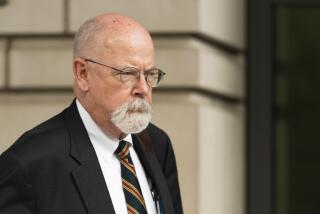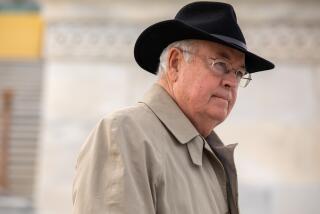Starr Won’t Seek to Retry McDougal, Steele
- Share via
WASHINGTON — Independent counsel Kenneth W. Starr announced Tuesday that he would not seek to retry two women accused of hindering his five-year investigation of President Clinton, a decision that offers the firmest indication to date that Starr may be wrapping up his far-reaching but often frustrating inquiry.
Starr had failed to gain convictions in recent months against either Whitewater figure Susan McDougal or Virginia resident Julie Hiatt Steele, both of whom allegedly sought to block Starr’s prosecutors from ferreting out the truth of accusations against Clinton.
A jury in Arkansas acquitted McDougal in April on an obstruction charge and failed to reach a verdict on two contempt counts, while a deadlocked Virginia jury forced a mistrial in Steele’s obstruction case earlier this month.
Starr informed the respective federal judges of his decision on Tuesday, his office said.
The action leaves Starr with charges pending against a lone defendant in his wide-ranging investigation--Webster L. Hubbell, a former Justice Department official and friend of the Clintons who is charged with tax evasion and false testimony. But the bigger question that has been percolating for months is whether Starr will seek to prosecute Clinton, either before or after the president leaves office.
Starr’s statement referred obliquely to “active matters remaining to be completed and further proceedings to be conducted,” but several legal observers said they believe the McDougal-Starr decisions signal that the independent counsel is preparing to close up shop.
Starr was prompted to abandon the McDougal case by the “near-impossibility of seating an impartial jury” in Little Rock, Ark., a spokeswoman said. And in Steele’s case, the decision on whether to retry the onetime confidant of Clinton accuser Kathleen Willey forced Starr to confront the question of “resource allocation,” his office said in a statement.
“The [Steele] case was appropriate and proper to indict and present to a trial jury, but the jury’s inability to reach a unanimous verdict is a reality that we have taken seriously and respectfully,” Starr said.
Some observers, however, suggested that Starr’s decision was perhaps an acknowledgment of his political, as well as legal, difficulties.
The impeachment proceedings against Clinton, prompted by Starr’s report on the Monica S. Lewinsky matter, heightened political and public criticism of Starr’s multifaceted investigation--which is estimated to have cost taxpayers more than $40 million.
The public long has been clamoring for an end to the slew of scandals that have wracked the presidency, said former Watergate prosecutor and Clinton defender Richard Ben-Veniste, “and I think the good sense of the American people has somehow permeated Mr. Starr’s thinking at long last.”
Key deputies to Starr have left his office in recent weeks, and Starr himself has hinted that he might be willing to turn over some segments of his investigation to the Justice Department. In recent testimony before Congress, he opposed renewal of the independent counsel statute that empowers him. Now, with the decisions on McDougal and Steele, he has removed two major issues from his plate.
Former independent counsel Lawrence E. Walsh, whose investigation into the Iran-Contra affair lasted more than six years, said that time may be running out for Starr, who was appointed to look into Whitewater land deal in 1994.
“Public interest has dropped off, and after four or five years, the passage of time depreciates the value of these cases,” he said in an interview. “The big question now is if he’s going to try to keep the shop open” simply to leave open the possibility of prosecuting Clinton.
McDougal, charged with refusing to answer questions before a grand jury investigating the Whitewater matter, said Tuesday that she remains angry at Starr despite the decision not to reprosecute her.
“I’m glad it’s over, but it should have always been over,” she said. “It never should have happened. The taxpayers should be given their [money] back, and I should be given my life back.”
Her Los Angeles attorney, Mark Geragos, who focused virtually his entire defense at the Little Rock trial on the tactics used by Starr’s prosecutors, said the decision was “bittersweet” for him.
“I love Little Rock, and I would love to have gone back there and had some more fun with Starr,” he said. “But I think somebody gave him some smelling salts and he came to his senses.”
But Nancy Luque, defense attorney for Steele, said she had been concerned that Starr would decide to retry her client. “How can one not be after this odyssey?” she asked.
Luque said Steele was in disbelief when she learned of the decision. “Really? Do you mean it? I’m so happy” she quoted Steele as saying.
Steele was thrust into the middle of the Lewinsky phase of Starr’s investigation because of her once-close relationship with Willey, who alleged that Clinton had groped her during a 1993 encounter in the White House. Steele denied to a grand jury and the FBI that Willey had ever told her about the episode, but prosecutors said she was lying and charged her with obstruction.
The foreman of the jury said in a recent interview that the jury was leaning toward conviction by a vote of 9-3 when it deadlocked.
*
Times staff writer Ann O’Neill in Los Angeles contributed to this story.
More to Read
Get the L.A. Times Politics newsletter
Deeply reported insights into legislation, politics and policy from Sacramento, Washington and beyond. In your inbox twice per week.
You may occasionally receive promotional content from the Los Angeles Times.










